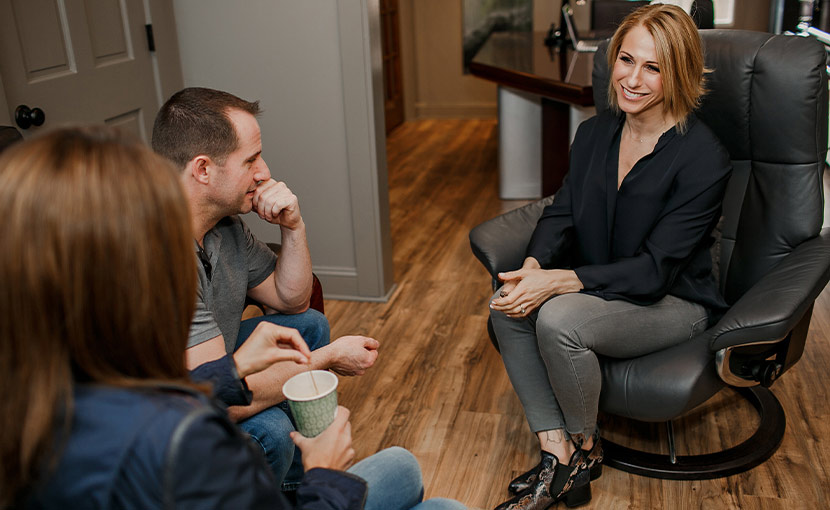Parenting Support

Parenting is the most formidable task in the world, and most of us do it without enough physical and emotional support. If you are suffering as a parent, you may believe you just have to “suck it up,” tolerate feeling terrible and wait-out the rough patches. But this is a myth. If you are overwhelmed too much of the time, something is wrong.

Is what I’m feeling “normal”?
No matter how old your child is, if you feel any of the following more often than not, then you are experiencing too much distress:
- Angry
- Confused about, or not understanding, your child’s behavior
- Guilty
- Anxious
- A sense that something isn’t right
- Dull inside or a lack of joy
- Impatient or spread too thin
- Unloved
- Resentful
- Worried you are not doing enough, or are doing something wrong
- Flustered or chaotic
She will help you learn to parent in a way that brings you closer to your child, and to the type of parent you would like to be. In your sessions you will learn to:
- Manage your own emotions under stress
- Uncover the meaning of your child’s actions
- Add humor to your interactions
- Experience your child’s behaviors as manageable and non-threatening
- Understand how you and your child affect one another
Confidence
Pride
Joy
Empathy
Wisdom

What is parent support?
Unlike parenting classes, Dr. Agree’s parent support sessions focus exclusively on your relationship with your child. This is intense and targeted work, aimed at improving your reflective functioning (also called the capacity to Mentalize). You will learn to relate to your child in an entirely new way – one that is more sensitive, positive and enjoyable.
Reflective functioning is the ability to view behavior in terms of underlying intention. In other words, we consider what thoughts, feelings, beliefs and desires might underlie a person’s action (or inaction).
In reflective parenting we look beyond our child’s behaviors in an effort to understand “Why might my child be doing that”? We also learn to ask similar questions about our self. When we do this, we glean new perspectives that free us from the spiral of frustration and helplessness.
It is the cornerstone of a secure attachment
It improves cognitive and social development
It enhances emotional control and reduces behavior problems
It increases attention
Initial meeting
During your initial meeting, Dr. Agree will listen to what has brought you in, such as, difficulties in your family, problems in your relationship with your child, any behavioral problems your child may be exhibiting, and anything else you wish to discuss. Near the end of the session, Dr. Agree will offer her perspective. She will let you know if she can help, and answer any questions you may have. Occasionally, she may request an additional session if she believes more details are required to provide you with an informed response.
Read more about Your First Visit.
Reflective Functioning assessment
The assessment process generally comprises two sessions During this time, Dr. Agree will inquire into your history and background, and assess your mentalizing vulnerabilities and strengths in a relaxed, non-judgmental manner. This process is important because it reveals the areas that require attention, provides a baseline from which to measure progress, and allows Dr. Agree to tailor subsequent sessions to your specific needs.
Written analysis
Following the assessment, Dr. Agree will compile the information you have provided, and draft a written formulation that includes:
- Problem areas in your relationship with your child
- Reflective functioning challenges and strengths
- Areas of suggested focus
The formulation is a collaborative, non-critical, tool. It is meant to help you begin to create a “parenting map,” which will grow and develop in tangent with your understanding of yourself as a parent.
Become more reflective
The preponderance of sessions will focus on improving reflective functioning/mentalization through education, semi-structured exercises and tools to use at home. Dr. Agree will help you learn to:
- Identify factors that contribute to breaks in connection and misunderstandings with your child
- Discern how your own feelings, assumptions and expectations impact your reactions
- Approach your child, and yourself, with more curiosity, empathy and humor.
Becoming a more reflective parent takes practice. During each session Dr. Agree will check in with you to find out what is working and what is not. She is committed to providing the support you need while helping you improve in as many domains as possible.
- The amount of help you wish to receive
- The extent of negativity between you and your child, from each of your perspectives
- Your level of reflective functioning. Some people acquire the skills easily, while others find it difficult and require more support.
Additional sessions and periodic support sessions are always available.
Please click here for an article on talking to your teenager and here for suggested parenting books and resources.

At every age,
high reflective function is the single greatest gift you can give your child, and the amazing thing is that you transmit this ability by simply doing it yourself. (read article)
